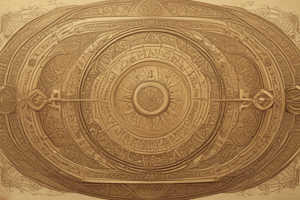Podcast
Questions and Answers
What is the term used to describe the part of the Earth where living organisms interact with their environment?
What is the term used to describe the part of the Earth where living organisms interact with their environment?
- Cellular organization
- Ecosystem
- Biosphere (correct)
- Zone of life
What is the main difference between prokaryotic and eukaryotic cells?
What is the main difference between prokaryotic and eukaryotic cells?
- Type of cellular organization
- Cell shape
- Not specified in the text (correct)
- Cell size
How many major groups are organisms divided into?
How many major groups are organisms divided into?
- Five (correct)
- Three
- Six
- Four
What is the characteristic of unicellular organisms?
What is the characteristic of unicellular organisms?
Which of the following is NOT a type of cellular organization?
Which of the following is NOT a type of cellular organization?
Which of the following organisms is an example of a unicellular organism?
Which of the following organisms is an example of a unicellular organism?
What is the characteristic of colonial organisms?
What is the characteristic of colonial organisms?
What is the term used to describe the zone of life on Earth?
What is the term used to describe the zone of life on Earth?
How do cells organize in organisms?
How do cells organize in organisms?
Which of the following is a characteristic of multicellular organisms?
Which of the following is a characteristic of multicellular organisms?
Flashcards are hidden until you start studying
Study Notes
Muslim Scientists
- Abdul Malik Asmai (740 - 828 AD) is considered the first Muslim scientist who studied animals in detail, and wrote famous books including “Al-Abil (camel)”, “Al-Khail (horse)”, “Al-Wahoosh (animal)”, and “Kalq al-Ansan”.
- Bu Ali Sina (980 - 1037 AD) was a physician, philosopher, astronomer, and poet, and is known as the founder of medicine in the West, with his book “Al-Qanun-fi al-Tib” being known as the canon of medicine.
- Jabir Bin Hayan (721 - 815 AD) introduced experimental investigation in chemistry and wrote books on plants and animals, including “Al-Nabatat” and “Al-Haywan”.
Levels of Organization
- Biologists study biological organization at multiple levels, including subatomic, atomic, molecular, cellular, tissue, organ, organ system, and biosphere levels.
- At the subatomic level, atoms are made up of electrons, protons, and neutrons.
- There are 92 naturally occurring elements, with 16 being bioelements that make up living organisms, and six of these (O, C, H, N, Ca, & P) making up 99% of the total mass.
Cellular Organizations
- All organisms are made up of cells, which can be classified as prokaryotic or eukaryotic.
- Cells can organize in three ways: unicellular, colonial, and multicellular.
- Unicellular organisms, such as Amoeba, Paramecium, and Euglena, consist of a single cell that carries out all life activities.
- Colonial organisms are made up of many unicellular organisms that live together but do not have any division of labour.
Biosphere
- The part of the Earth inhabited by organisms and their communities is known as the biosphere, which constitutes all ecosystems and is also called the zone of life on Earth.
Studying That Suits You
Use AI to generate personalized quizzes and flashcards to suit your learning preferences.




